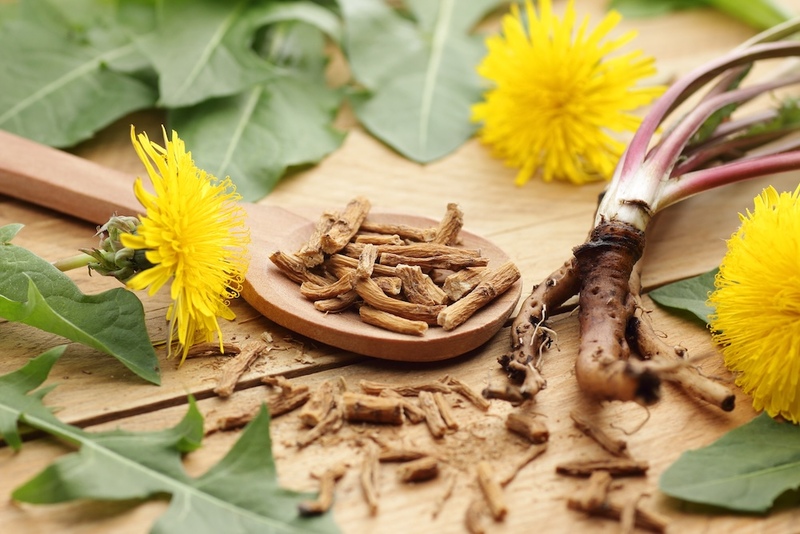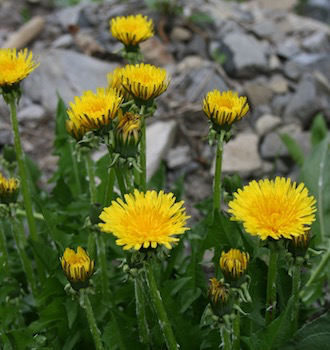 In spring, the bright yellow blossoms of dandelions start popping up in lawns, vacant lots, and roadsides. And I've often even seen entire fields emblazoned with them. I remember seeing one such field as a teenager and wondering why so many people seem to hate dandelions. From their yellow blossoms, which are so bright and cheerful, to their round seed heads, which have entertained so many wishes, dandelions are kind of fun. There’s something innocent and child-like about them.
In spring, the bright yellow blossoms of dandelions start popping up in lawns, vacant lots, and roadsides. And I've often even seen entire fields emblazoned with them. I remember seeing one such field as a teenager and wondering why so many people seem to hate dandelions. From their yellow blossoms, which are so bright and cheerful, to their round seed heads, which have entertained so many wishes, dandelions are kind of fun. There’s something innocent and child-like about them.
Years later, I learned something fascinating about plants; the plants we need the most tend to grow where we live. It’s a subset of the idea that everything in nature has a purpose. Although dandelions grow all over North America, they are native to Europe. They were brought here by European settlers and they followed the spread of those settlers across the continent. So if the plants growing nearby are the ones we need, it begs the question—why are dandelions so plentiful?
So Why All the Dandelions?
 Let’s start with how dandelions may be there to help us with our health needs. In my years consulting with people I’ve always tried to identify what I call primary organ weaknesses. The idea is that the body can be no stronger than its weakest link. If you find the weakest system in the body and strengthen it, all the other systems improve. In my experience, the weakest systems in most people are, in order: the stomach, the liver, and the kidneys. And it just so happens that dandelion is a great remedy for all three of these important organs.
Let’s start with how dandelions may be there to help us with our health needs. In my years consulting with people I’ve always tried to identify what I call primary organ weaknesses. The idea is that the body can be no stronger than its weakest link. If you find the weakest system in the body and strengthen it, all the other systems improve. In my experience, the weakest systems in most people are, in order: the stomach, the liver, and the kidneys. And it just so happens that dandelion is a great remedy for all three of these important organs.
Dandelion roots are primarily a liver remedy, but they also help the stomach and kidneys. The bitter roots stimulate bile flow and aid liver detoxification, which is interesting when you think about how many people try to rid their yards with herbicides. But despite being poisoned the dandelions keep returning. That’s a signature that suggests that dandelion is a good remedy for helping us deal with toxic environments.
Dandelion leaf is a potassium-rich diuretic that supports healthy kidney function. The leaves are edible when picked young, before the plant blooms. Otherwise, they’re too bitter to be used for food.
Both the roots and the leaves act as a digestive bitter, helping to stimulate hydrochloric acid production and pancreatic enzymes to digest food. That’s why dandelion is a frequent ingredient in digestive bitters formulas. The root is also high in inulin, which helps feed the friendly flora in the digestive tract. The roots are technically edible but are just too bitter to be practical to eat. However, like chicory root, they are dried, roasted, and ground to make a coffee substitute.
The bottom line to all this is that dandelion is a very useful medicine for some of the common health problems that plague people in modern society. They grow near us because they're there to help heal our bodies.
Dandelion Flower Essence
 There may be a deeper reason why we need dandelions, which has to do with their indications as a flower essence. Dandelion flower essence is helpful for people who over-strive and over-form their lives. In other words, they try too hard; they’re too rigid, overworked and overstressed. As a result, they hold a lot of tension in their body, particularly in the solar plexus.
There may be a deeper reason why we need dandelions, which has to do with their indications as a flower essence. Dandelion flower essence is helpful for people who over-strive and over-form their lives. In other words, they try too hard; they’re too rigid, overworked and overstressed. As a result, they hold a lot of tension in their body, particularly in the solar plexus.
One of the frequent root problems I’ve seen in people is a hiatal hernia, which adversely affects digestion and weakens the whole body. Nearly all chronically ill people have one. Dandelion flower essence helps with the hiatal hernia. It takes the tension out of the body and rigidity out of the personality. It helps a person have a flowing energy that moves with the rhythms of life. It also helps them listen to their gut instincts.
So, that's another reason why dandelions may follow us. As a culture, we all need to relax more, trust our conscience, and move with the flow of life.
Nature and Balance
That brings up a point about weeds in general. Years ago, someone told me that when they improved the soil conditions in their lawn, the dandelions stopped growing there. I thought of this when I was struggling with weeds on my property. So I bought two books from acreasusa.com, an organization dedicated to genuine organic agriculture. One is called When Weeds Talk by Jay L. McCanan and the other Weeds: Control Without Poisons by Charles Walters.
These books explain how weeds are indicators of imbalances in the soil. When you correct the soil conditions, you control the weeds naturally. Dandelions are supposed to be indicators of overly compacted soil that is too acidic, which means it needs more calcium. So, like all weeds, dandelions may be serving an important function in nature. Harking back to the flower essence indications, our fight against them is motivated by an excessive need control nature, an attempt the dandelions seem to mock.
 When I was young I delighted in seeing the dandelions blooming in the spring. And as I’ve learned about their role in the soil, their health benefits, and their use as a flower essence, my appreciation for them has grown even greater. They remind me to not take myself too seriously and get tense because things don’t always go the way I want. They remind me that I can survive, even in difficult times, if I just take things one day at a time. I feel that the dandelions of the field, which keep growing in spite of our efforts to eradicate them, are a reminder to put my trust in God, hold onto a sunny and playful nature, and trust that if I sow good seeds into the world I’ll be taken care of no matter which way the winds are blowing.
When I was young I delighted in seeing the dandelions blooming in the spring. And as I’ve learned about their role in the soil, their health benefits, and their use as a flower essence, my appreciation for them has grown even greater. They remind me to not take myself too seriously and get tense because things don’t always go the way I want. They remind me that I can survive, even in difficult times, if I just take things one day at a time. I feel that the dandelions of the field, which keep growing in spite of our efforts to eradicate them, are a reminder to put my trust in God, hold onto a sunny and playful nature, and trust that if I sow good seeds into the world I’ll be taken care of no matter which way the winds are blowing.
Steven's Articles
-

-
Eucommia Bark
A superior tonic that promotes kidney, structural,…
January
-

-
Goldenthread, Phellodendron, and Yellow Root
Three herbal remedies containing the infection-fighting…
-

-
Teasel
A traditional herb for healing bones and joints…
-

-
Barberry and Healthy Personal Boundaries
A thorny shrub for fighting infections and supporting…
December
-

-
The Evidence for Berberine
A yellow alkaloid found in traditional infection-fighting…
-

-
The Sensible Use of Caffeinated Herbs
Kola nuts, guarana, and yerba mate and other herbs…
-

-
The Health Benefits and Problems with Coffee
This popular caffeinated beverage can be beneficial…
October
-

-
Understanding Caffeine & Cellular Adaptation
Preserving the power of caffeine's buzz and the…
September
-

-
Horseradish
A pungent spice for aiding protein metabolism…
-

-
Banaba or Crepe Myrtle
A beautiful tree from Southeast Asia whose leaves…
August
-

-
Monkeyflowers
Flower essences to help see ourselves more clearly…
-

-
Mariposa Lilies
Strengthening the bond between mother and child…
-

-
The Noble Bay Leaf
A common kitchen herb for aiding digestion and…
-

-
Epimedium: Horny Goat Weed
A circulatory stimulant and kidney yang tonic…
July
-

-
The Medicinal and Nutritional Benefits of Apricots
A nutritious fruit and valuable medicinal seed for coughs

